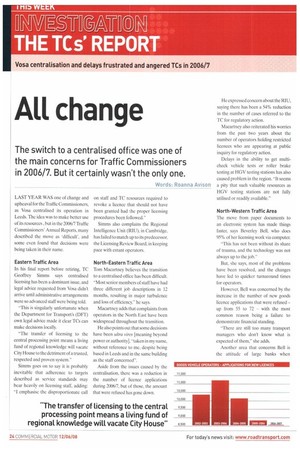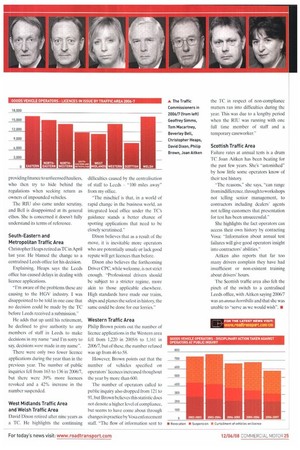All change
Page 24

Page 25

If you've noticed an error in this article please click here to report it so we can fix it.
The switch to a centralised office was one of the main concerns for Traffic Commissioners in 2006/7. But it certainly wasn't the only one.
Words: Roanna Avison LAST YEAR WAS one of change and upheaval for the Traffic Commissioners, as Vosa centralised its operation in Leeds. The idea was to make better use of its resources , but in the 2006/7 Traffic Commissioners' Annual Reports, many described the move as 'difficult', and some even found that decisions were being taken in their name.
Eastern Traffic Area
In his final report before retiring, TC Geoffrey Simms says centralised licensing has been a dominant issue, and legal advice requested from Vosa didn't arrive until administrative arrangements were so advanced staff were being told.
-This is singularly unfortunate when the Department for Transport's (DFT) own legal advice made it clear TCs can make decisions locally.
"The transfer of licensing to the central processing point means a living fund of regional knowledge will vacate City House to the detriment of a trusted, respected and proven system.
Simms goes on to say it is probably inevitable that adherence to targets described as service standards may bear heavily on licensing staff. adding: "I emphasise the disproportionate call on staff and TC resources required to revoke a licence that should not have been granted had the proper licensing procedures been followed."
Simms also complains the Regional Intelligence Unit (RIU), in Cambridge. has failed to match up to its predecessor, the Licensing Review Board, in keeping pace with errant operators.
North-Eastern Traffic Area Tom Macartney believes the transition to a centralised office has been difficult. "Most senior members of staff have had three different job descriptions in 12 months, resulting in major turbulence and loss of efficiency," he says.
Macartney adds that complaints from operators in the North East have been widespread throughout the transition.
He also points out that some decisions have been ultra vires [meaning beyond power or authority], "taken in my name, without reference to me, despite being based in Leeds and in the same building as the staff concerned".
Aside from the issues caused by the centralisation, there was a reduction in the number of licence applications during 2006/7, but of those, the amount that were refused has gone down. He expressed concern about the R1U, saying there has been a .54% reduction in the number of cases referred to the TC for regulatory action.
Macartney also reiterated his worries from the past two years about the number of operators holding restricted licences who are appearing at public inquiry for regulatory action.
Delays in the ability to get multicheck vehicle tests or roller brake testing at HGV testing stations has also caused problem in the region. "It seems a pity that such valuable resources as HGV testing stations are not fully utilised or readily available."
North-Western Traffic Area The move from paper documents to an electronic system has made things faster, says Beverley Bell, who does 95% of her licensing work via computer.
"This has not been without its share of trauma, and the technology was not always up to the job."
But, she says, most of the problems have been resolved, and the changes have led to quicker turnaround times for operators.
However, Bell was concerned by the increase in the number of new goods licence applications that were refused up from 55 to 72 with the most common reason being a failure to demonstrate financial standing.
"There are still too many transport managers who don't know what is expected of them," she adds.
Another area that concerns Bell is the attitude of large banks when providing finance to unlicensed hauliers, who then try to hide behind the regulations when seeking return as owners of impounded vehicles.
The RIU also came under scrutiny, and Bell is disappointed at its general ethos. She is concerned it doesn't fully understand its terms of reference.
South-Eastern and Metropolitan Traffic Area Christopher Heaps retired as TC in April last year. He blamed the change to a centralised Leeds office for his decision.
Explaining, Heaps says the Leeds office has caused delays in dealing with licence applications.
"I'm aware of the problems these are causing to the HGV industry. 1 was disappointed to be told in one case that no decision could be made by the TC before Leeds received a submission."
He adds that up until his retirement, he declined to give authority to any members of staff in Leeds to make decisions in my name "and I'm sorry to say, decisions were made in my name".
There were only two fewer licence applications during the year than in the previous year. The number of public inquiries fell from 163 to 136 in 2006/7, but there were 39% more licences revoked and a 42% increase in the number suspended.
West Midlands Traffic Area and WeLsh Traffic Area David Dixon retired after nine years as a TC. He highlights the continuing difficulties caused by the centralisation of staff to Leeds — "100 miles away" from my office.
"The mischief is that, in a world of rapid change in the business world, an integrated local office under the TC's guidance stands a better chance of spotting applications that need to be closely scrutinised.
Dixon believes that as a result of the move, it is inevitable more operators who are potentially unsafe or lack good repute will get licences than before.
Dixon also believes the forthcoming Driver CPC, while welcome, is not strict enough. "Professional drivers should be subject to a stricter regime, more akin to those applicable elsewhere. High standards have made our trains, ships and planes the safest in history, the same could be done for our lorries."
Western Traffic Area Philip Brown points out the number of licence applications in the Western area fell from 1,220 in 2005/6 to 1,161 in 2006/7, but of these, the number refused was up from 46 to 58.
However, Brown points out that the number of vehicles specified on operators' licences increased thoughout the year by more than 600.
The number of operators called to public inquiry also dropped from 121 to 91, but Brown believes this statistic does not denote a higher level of compliance, hut seems to have come about through changes in practice by Vasa enforcement staff. "The flow of information sent to the TC in respect of non-compliance matters ran into difficulties during the year. This was due to a lengthy period when the RIU was running with one full time member of staff and a temporary caseworker."
Scottish Traffic Area Failure rates at annual tests is a drum TC Joan Aitken has been beating for the past few years. She's "astonished" by how little some operators know of their test history.
"The reasons," she says, "can range from indifference, through toworkshops not telling senior management, to contractors including dealers' agents not telling customers that presentation for test has been unsuccessful."
She highlights the fact operators can access their own history by contacting Vosa: "Information about annual test failures will give good operators insight into contractors' abilities."
Aitken also reports that far too many drivers complain they have had insufficient or non-existent training about drivers' hours.
The Scottish traffic area also felt the pinch of the switch to a centralised Leeds office, with Aitken saying 2006/7 was an annus horribilis and that she was unable to "serve as we would wish". •
















































































































































































